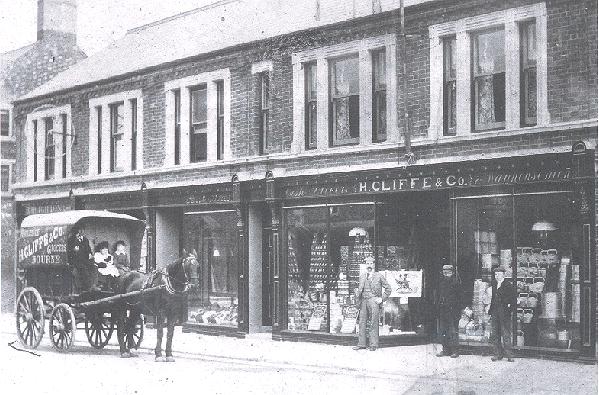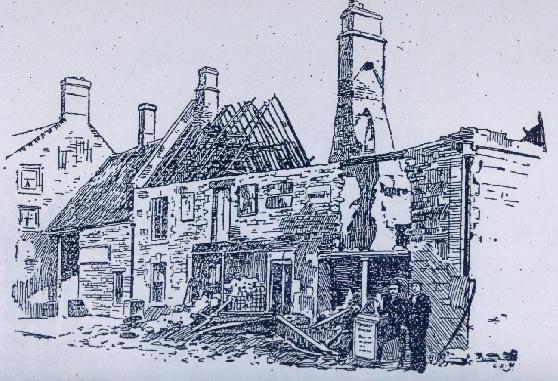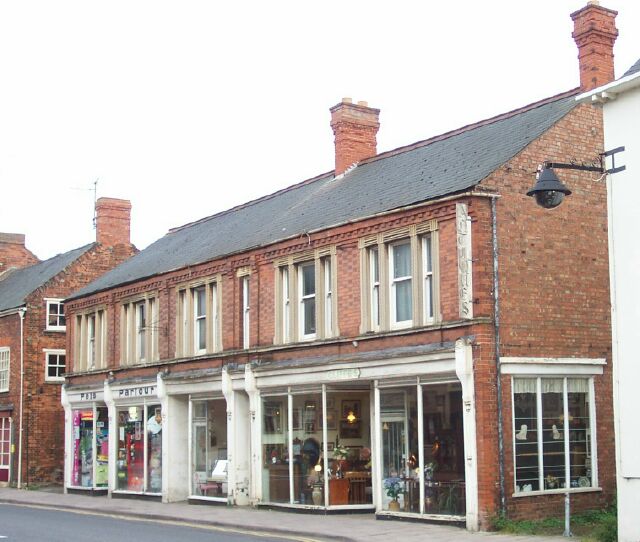|
The Cliffe shop fire
The Cliffe family have been prominent in Bourne for more than 100 years and during much of that time were associated with the shop premises at Numbers 29-31 West Street. The business was founded in the late 19th century by Herbert Cliffe who had moved from Peterborough and rented the premises to begin trading as a grocer and general dealer as H Cliffe and Co. He was born in 1866, son of William Cliffe, a general dealer based in Peterborough, and his wife Mary, who no doubt financed their son's venture. By 1891, Herbert had married a girl from Wisbech named Sarah, then aged 31, and they were living over the shop in West Street. The business was successful from the start but their fortunes changed dramatically when a disastrous fire early on the morning of Sunday 30th October 1898 wrecked the premises. The blaze was reported by the Stamford Mercury the following week, on Friday 4th November, in a dramatic eye-witness account:
On Sunday morning, between 1 am and 2 am, a fire was discovered in the grocery stores of Mr Herbert Cliffe, West-street. Mr Nixon, who lives next door, noticed a smell of burning, and, on rising and coming into the yard, observed flames issuing from a window of an upper storeroom in the rear of the building. Going out into the street, he met guard Walton coming off duty, who at once rang the fire bell, while Mr Nixon summoned firemen living near. Within a very short time Captain James Shilcock, Lieutenant Francis Clarke, Chief Engineer Teat, and the members of the brigade were on the scene of the conflagration. The manual was brought out into immediate use and soon, under the energetic and skilful direction of Captain Shilcock and Lieutenant Clarke, two branches, one from the West Street front and the other from the rear, were pouring continuous and copious streams upon the raging mass.
The blaze had gutted the premises leaving only the outside walls and the chimney stacks still standing and the next week, the Lincolnshire Free Press carried a picture and a report that read as follows: THE GREAT SHOP FIRE OF BOURNE The Ruins of Mr Cliffe's Grocery Stores The above sketch, which has been engraved from a photograph taken by Mr. W H Redshaw, photographer, Bourne, represents the scene in West Street after the great fire of Sunday week, when Mr H Cliffe's grocery stores were burnt out and damage done to the amount of nearly £2,000 (£125,000 at today's values). There is but little to add to the descriptive report of the conflagration as given in our last issue. The cause of the fire is still a mystery but it appears that the outbreak began near the roof, at a spot where matches were stored, and the suggestion has been made - and received as a possible solution of the matter in some quarters - that a cat or rat in its nocturnal rambles knocked over a packet of matches, and the fall caused them to ignite. Whether, however, the theory is the correct one must remain undecided. The loss appears to have been fairly well covered by insurance, both on the part of Mr Cliffe, the occupier, and the Wither's Trustees, the owners. Mr Cliffe's insurance, which he doubts will not altogether cover his loss, is in the Eastern Counties Insurance Office. The premises were old and built largely of stone, and viewed as they were last week by a large number of spectators, the destruction looked complete. Altogether the scene of the fiery wreck presented a dismal spectacle of blackened heaps, and gaping walls. In some places the walls have collapsed. The work of salvage has been carried on, not without considerable difficulty and danger. The debris, piled up in dreary heaps on the ground floor, was a bewildering commingling of the contents of the ground floor, second, and upper stories of the establishment. Knuckle-bones of scandalously frizzled hams, reminding one of Charles Lamb's deliciously humorous narrative of the origin of the Chinamen's affection for prohibited pork; ruined tins and casks of grocery wares; portmanteaux smashed and battered even worse than a Continental railway porter could perform the feat; and, in the very irony of circumstance, pretty bedsteads crushed and twisted beyond all hope of recovery. Since the photograph reproduced above was taken the large chimney stack in the centre has been in part demolished, being a possible source of danger, and a second tottering chimney has also been taken down. On Thursday last, the outside debris was being cleared away, and the place boarded up, but fragments of what were once biscuits and jam were still to be seen in the vicinity of the pavement. As late as Wednesday last, there was a fresh outbreak of the fire to a slight extent, but a bucket or two of water promptly extinguished it. The freehold of the property at that time was owned by the Manor of Bourne and leased to Herbert Cliffe by Wither's Trustees but after the fire, it was put up for sale by public auction. The sale was held at the Nag's Head Hotel on Thursday 18th May 1899 and included the parcel of land with a frontage of 67 feet on West Street containing the gutted grocery store, an adjoining yard, two tenements, warehouses and a workshop. The auctioneer was Mr F G Shilcock who sold the property to the former occupant, Mr Herbert Cliffe, for £720 [almost £50,000 by today's values]. He rebuilt the premises and they were subsequently taken over by Herbert's younger brother, Edward Cliffe, who had returned from South Africa after serving with the army in the Boer War of 1899-1902, and he began dealing in second hand furniture that was sold at periodic auctions on the premises. The restoration of the shop was carried out by John Wilcox, a carpenter from Dyke, who used mainly wood for the interior and much of it survives today including the panelling, ceilings, front door and the cash office where buyers settled their bills.
In recent years, the shop has been owned by Edward Cliffe's son, Ray, and his wife Shirley, while the removals business they also started in the 1950s is now run as a separate concern by their son David. The couple retired in March 2003 and the building was sold to developers who carried out a complete refurbishment of the building before re-opening in the spring of 2004 with several different retail businesses operating from the premises.
REVISED OCTOBER 2010 See also Ray and Shirley Cliffe The Town Council Earthquake, fire and flood Letters from the Boer War
Go to: Main Index Villages Index
|


